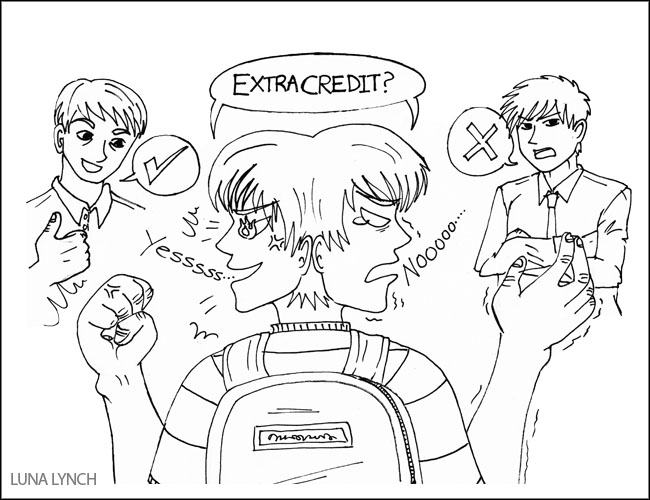
At the end of any given semester, students frantically prepare for finals and scramble to secure their final grades. Many are in jeopardy of being little less than half a percent away from their goal grade. When it comes down to crunch time, students find themselves at the mercy of their teacher’s grading policy. While some teachers provide opportunities for students to bump up their grade through extra credit, many already have an established policy of no extra credit.
When faced with a borderline grade, many students request extra credit from their teacher to bump up their grade. The extra credit may be that last little push that someone needs to bring up their grade as desired. Senior Hillary Koh says “I think it’s a good thing because you are still working for credit and it is up to you whether you want to do it or not.”
With so many teachers at Aragon, extra credit policies vary depending on each teacher. Some teachers opt to provide opportunities for extra credit, while others choose to not offer extra credit. Junior Wyatt Cooper says of teachers that do not offer extra credit, “They might think it’s not necessary and it’ll make students less motivated because they’ll know they can get extra credit.”
At times extra credit can add more work for a teacher trying to keep everything fair. English teacher Holly Dietz says “I do not offer extra credit almost ever because it is a lot of work trying to keep the playing field level. Extra credit can invite trouble and without extra credit everyone is offered the same opportunities.”
Furthermore, too much extra credit being offered can prompt a student to depend on extra credit. Junior Garrett Tan says “[Extra credit] can kind of reward people that slack off during the semester because they slack off then make it up.“ Adds sophomore Sean Gao, “If it’s worth a huge percentage of your grade then it will be unfair because you could just use extra credit to improve your grade.”
Other teachers decide not to offer extra credit as it can give students false expectations. “I generally say I don’t offer extra credit because I don’t want the students to expect it and I don’t want them to ask for it,” says English teacher Tiffany Wang. “Extra credit that doesn’t relate to the curriculum just wouldn’t be helpful.”
On the other hand, there are teachers that offer extra credit. Extra credit can be offered sometimes if a teacher feels their class was not taught as planned. Cooper deduces the reasons teachers offer extra credit saying, “They might feel like the class moved at a faster pace or something was off, maybe people weren’t doing as well as normal.” Gao adds “Teachers choose to offer extra credit because they feel like we have enough stress already or realize some people aren’t doing too well.”
In some cases the nature of the subject itself is what prompts teachers to offer extra credit. Chinese teacher Qi Fan says, “I think the nature of the Chinese language is very hard. In order to encourage students to make more effort I like to offer extra credit for the students who deserve the credit if they are making extra effort. Extra credit really aligns with my philosophy because I think the students that put in extra effort should be recognized and it will reflect in their grades. ”
Similar to extra credit, how teachers round grades may make or break a grade. When it comes to rounding grades some teachers firmly stick with the final grade of the student. “My policy is that I don’t round up the grades because I offer extra credit to the students,” says Fan.
“Sometimes rounding up can be kind of ridiculous because it gives people more of a cushion. Like someone with a 3% lower grade can end up with the same grade [as someone with a higher percentage],” says Tan.
Other teachers may round grades up depending on the circumstance. Cooper says “I think teachers should round up if it is within half a percent away. Also they should judge based on the student and what the student deserves.”
Dietz says “I never round down and come with the philosophy that I’m not infallible. So if someone comes within in few points [I ask] have they been a good contributor? And if so, I round up.”
Cooper says “I haven’t encountered a teacher that doesn’t round up.” Gao concludes that “It’s a good idea to round up because students have tried so hard it is really a small percentage, unless they don’t participate in class.”
Although views of extra credit and rounding may vary according to each teacher and student, it is well agreed that students should not rely on either to boost their grade at the end of the semester.





